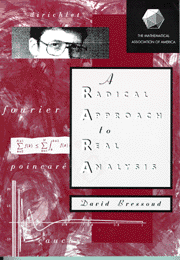
Instructor: Tom Hull (Mendel 256,
x4334)
Class times: Tuesday and Thursday, 2:00-3:15
Room: Mendel 210 (the conference room!)
Text: A Radical
Approach to Real Analysis by David Bressoud
The last time I checked, this course had only 7 people in it, so we should be getting nice and cozy!
HANDOUTS: The Riemann Integral
Description: In one sense real analysis
is just doing calculus all over again, only this time we prove everything.
But in another, larger sense this class is much more than that. It's about
setting up a system to analyze things like calculus thoroughly and rigorously
so that we can move beyond calculus. That is the real goal of real analysis.
(Ha!)
But
our approach in this course will be very different from the "traditional"
approach to real analysis. We will be using a very radical text,
which takes a historic approach to the subject. That is to say, the
book starts off by asking, "So in the 1800s people had been using calculus
for over 200 years, and they started to encounter serious problems ? problems
that were very controversial and forced mathematicians to doubt the foundations
of calculus! What were these problems? What did they do about
them?" We will see that some of the very things you learned about
in Calculus II, like power series, can lead to problems which caused 19th
century mathematicians to get very very upset!
It
is my hope that by seeing the historic problems behind calculus, we'll
gain a better understanding of WHY the rigor of real analysis was necessary.
This should, in turn, make it easier to understand.
The
author of the book, David Bressoud, says is better on his web
page
"Calculus underwent some fundamental changes in the 19th century. Many of the concepts that people had thought to be intuitively clear started running up against situations where it wasn't so clear what they meant or how they were to be used: limits, continuity, slopes, areas, curves, even numbers needed to be given new and very precise definitions before mathematics could progress. Real analysis is the study of this reformulation of the foundations of calculus. To help understand where the new definitions came from and why they were chosen, this course will look at some of the problems that scientists were confronting in the early 19th century and the difficulties that led them to the definitions of real analysis."
Course Format: This will be a
READING course! It will also be a WRITING course! What does
that mean?
It
means that each class you'll have to READ a section of the book and look
at some of the exercise problems. Then in class we'll discuss the
section, answer any questions you have, and try working on the problems.
It
also means that you will have to WRITE up problems every week. In
Real Analysis 99% of the homework problems will be writing PROOFS.
Yes, that's right, proofs! We try to prove everything that you previously
learned in Calculus, and a few more things on top of that!
Computers and MAPLE: The textbook
includes computer code that allows you to explore and experiment with some
concepts, like the Newton-Raphson method and converging/diverging power
series, that are just too darned hard to do with paper and pencil alone.
In the book this code is written in Mathematica, a symbolic algebra
language. At Merrimack College we'll be using MAPLE, another symbolic
algebra language, instead. MAPLE will be available on the computers
in the Math Center. You will be required to use it in the readings
and for some of the homework assignments.
Now,
you're probably wondering HOW you're supposed to convert the Mathematica
code to MAPLE code, right? Fear not! Tommy
Ratliff of Wheaton College has already done the work for you, at least
for most of the exercises in this book, in his MAPLE
worksheets for A Radical Approach to Real Analysisweb page.
Check them out! They're a big help!
I'll probably be adding to this web page as the
course progresses. Be sure to visit frequently, especially when I
tell you!
Last updated: 8/20/01